
Recruitment campaign: Calling all future police officers SOUTH AUSTRALIA POLICE MAGAZINE 2022, ISSUE 2 YORKE MID NORTH POLICING | CRYPTOCURRENCY APY LANDS SECTION | OPERATION CAPTCHA
At SAPOL our people are our strength. Attracting the right calibre of people is the key to maintaining SAPOL’s high standing amongst the community. Despite a competitive labour market and low unemployment rate, SAPOL is gaining significant traction with the ‘Calling All’ recruitment campaign. The bold and innovative campaign has inspired and motivated potential recruits, generating a huge increase in applications from talented people with a broad and diverse range of interests.
For many new recruits their first taste of policing occurs in a regional setting. Yorke Mid North Local Service Area (LSA) is developing a strong reputation as an ideal training ground for probationary constables, who currently account for 31 per cent of the LSA’s patrol staff. They
have the perfect mentor in the LSA’s Officer in Charge, Superintendent Mark Syrus, who has spent nearly half his 42-year career in regional and remote policing. In this issue we explore the benefits of working in Yorke Mid North LSA and also delve into the life of Superintendent Syrus, the winner of the 2022 South Australia Police Officer of the Year.

We also venture to the APY Lands where team members from the recently established APY Lands Section have been making a positive difference in communities across a remote and unique environment. This engaging team profile is one of several stories focusing on our people, including Detective Sergeant Naomi Maidment who played an integral role in Port Adelaide’s debut season in the AFLW, and Police Security Officer Josef Milano who has enjoyed an interesting pathway to SAPOL.

Our people are also at the forefront of investigating emerging crimes and in this issue we explore the rapidly evolving world of cryptocurrency and its growing use in criminal activities and impact on policing. We also take an in-depth look at Operation Captcha – the largest cybercrime investigation SAPOL has ever been involved in.
MATHEW RODDA
ISSN 1448-1855
Editor and writer: Mathew Rodda

Editorial team: Mathew Rodda, Karina Loxton and Chief Inspector Melissa Gilchrist
Designed and printed by: Graphic Print Group
Photos: SAPOL Photographic Section, APY Lands Section, Brevet Sergeant Tammi Clifford, Senior Constable Adam Meyer, South Australian Police Historical Society, NSW Police Force, Bel Meyer, Kelly Barnes Photos, Matthew Sampson – Port Adelaide Football Club, Facebook, Shutterstock.

Blueprint is produced by SAPOL’s Marketing and Communications Unit, Police Headquarters, GPO Box 1539, Adelaide 5001.
Internal postcode: 120 Tel: 08 732 23294; Fax: 08 732 23289 Email: dlpolicegazette@police.sa.gov.au

Views and opinions expressed by contributors within this publication are not necessarily those of South Australia Police, the Commissioner of Police or the Government of South Australia. Articles, photographs and other contributions are welcome from every SAPOL employee.
SAPOL treats indigenous cultures and beliefs with respect. To many communities it is disrespectful and offensive to depict persons who have died. Aboriginal and Torres Strait Islander communities are warned this publication may contain such images and references.
COVER Senior Constable Doug Milera. Photo: Andrew Challen, SAPOL Photographic Section.
the
Content THIS PUBLICATION IS PRODUCED ON PAPER FROM SUSTAINABLE FORESTS AND PRINTED USING ENVIRONMENTALLY FRIENDLY VEGETABLE BASED INKS BY GRAPHIC PRINT GROUP.
ISSUE 2 New initiatives: Recruitment campaign Regional profile: Yorke Mid North Local Service Area > Operations: Operation Captcha > Team profile: APY Lands Section > Our people: PSO Josef Milano > Crime trend: Cryptocurrency 28 13 16 20 28 Blueprint SOUTH AUSTRALIA POLICE MAGAZINE Blueprint is licensed under a Creative Commons Attribution 3.0 Australia License . © Copyright South Australia Police 2022 4
•
From
Editor
2022,
COVID-19 response.
Unfortunately, our ability to get back to business has been hampered by the flood emergency and other emerging issues that are affecting all Australian police jurisdictions. While reported crime is returning to ‘preCOVID’ levels as anticipated, we have seen an increasing demand for police services, which continues to place pressure on our frontline.

The factors contributing to this demand and the opportunities to address it are being examined by the Premier’s Task Force which is assessing the future need for policing resources in South Australia and whether new and different skills are required and how these may be acquired.
By no means have we neglected our policing obligations over the past 24 months but we now have a renewed resolve to build safer communities for all to enjoy. There are also a number of opportunities on the horizon
that will allow SAPOL to better position ourselves for the future.
Recently there has been a great deal of focus on our staffing challenges. SAPOL is not alone in this – we have seen a national downturn in people applying to become police officers. In response, we have taken steps to streamline our recruit selection processes, and invested over $500 000 in recruit marketing. While this has resulted in a significant increase in applications, there are still challenges ahead.
As a way of supporting the frontline in the face of increasing demands, SAPOL has established the District Support Section – a team of seconded police officers taking on a number of taskings such as detainee conveyance, hospital guards, traffic control, property conveyance and welfare checks. This leaves our response members available to quickly respond to grade one and two taskings.
To permanently establish the District Support Section SAPOL was able to secure legislative change to the Police Act that has seen our Protective Security Officers evolve to become Police Security Officers (PSOs). This provides them with a broader range of powers and in consultation with
the workforce, the Police Association of SA and the Public Service Association, we are looking at the new PSO to undertake functions of the District Support Section and to be deployed as cell guards in our custody suites.
The State Government has also recently announced their decision to build the new Women’s and Children’s Hospital on the site occupied by the Thebarton Police Barracks. This means the historically significant site inhabited by SAPOL for over 105 years will shortly be demolished. While the loss is not without some sadness, SAPOL is embracing the relocation as a great opportunity. Mounted Operations, Dog Operations, State Operations Service and the Police Security Services Branch, amongst others, can look forward to new fit-for-purpose facilities that maximise operational requirements; while the Road Safety Centre, the Band of SA Police and the Police Historical Society can reimagine their community engagement spaces.
We don’t have a specific relocation timeframe but we have set up a project team to work with staff and stakeholders, and the government has committed
$2 million to assist with planning.
On a more sombre note, it was gratifying to see Domenic Perre held accountable for taking the life of Detective Sergeant Geoffrey Bowen and seriously injuring senior prosecutor Peter Wallis on 1 March 1994.
Perre was convicted and sentenced to 30 years’ imprisonment for his callous crimes, giving some comfort to the Bowen and Wallis families, as well as the wider police family in South Australia and Western Australia. We can all take comfort in knowing he has been exposed as the vile criminal he is.
I applaud the patrols who responded on the day, not knowing if there was still danger present, and the current and past members of the Major Crime Investigation Branch for their unyielding investigation, as well as the work of so many SAPOL staff from other areas that have supported the investigation over almost three decades.
The life sentence brings to a close this attack on the South Australian criminal justice system and our society in general. It stands as testament to our relentless pursuit of justice for victims, seeking to hold those responsible to account.
• GRANT STEVENS, COMMISSIONER
BLUEPRINT ISSUE 2 ~ 2022 1
SAPOL is gradually returning to normal after more than two years of disruption and uncertainty from our
There are a number of opportunities on the horizon that will allow SAPOL to better position ourselves for the future.
Commissioner's foreword
Running parallel to her gradual ascent in football has been a successful policing career.
AND THE PASSION THE POWER
On 3 September more than 5000 people crammed into Alberton Oval to witness ‘herstory’ in the making, as Port Adelaide Football Club’s AFLW team played its first home game on the hallowed turf the club’s SANFL team had
graced since 1880. Watching on proudly was Detective Sergeant Naomi Maidment, Port’s AFLW team’s inaugural list manager, as her diligence and planning came to fruition.

> OUR PEOPLE 2 BLUEPRINT ISSUE 2 ~ 2022
Detective Sergeant Naomi Maidment on the hallowed turf of Alberton Oval. Photo: Matthew Sampson – Port Adelaide Football Club.
A ppointed to the list manager role in February 2022, Detective Sergeant Maidment spent a frenetic few months assembling a 30-player list that will lay the foundations for future success in the expanding AFLW competition. Making this task more challenging was combining the pivotal role with running the club’s female Next Generation Academy program, a job she has been performing with aplomb for the past five years.
Somehow Detective Sergeant Maidment has also found time to carve out a highly successful policing career in Crime Gangs Task Force, where she has spent the bulk of the past 11 years of her 20-year career.
“Joining the AFLW is a momentous occasion for Port Adelaide Football Club so it’s very exciting to be part of history,” Detective Sergeant Maidment said.
“My vision has been to create a versatile and sustainable list, with the underlying pillar being recruiting the right type of person so the club can build a culture of success.
“Coaching the Next Generation Academy program has given me valuable insights regarding identifying local talent and creating AFLW pathways for young players.”
Detective Sergeant Maidment’s football journey began with watching her father play in the Southern Football League before getting involved herself, playing primary and high school football with boys, although cricket was her main passion for most of her junior sporting life.
“Football opportunities for females were fairly limited when I was growing up. There was the South Australian Women’s Football League which had only four teams, comprising 16-year-old girls right through to 40-year-old women so it wasn’t ideal,” she said.
With her policing career being her main focus and injuries taking their toll, Detective Sergeant Maidment transitioned from playing to coaching. She joined SANFL club West Adelaide, firstly coaching the women’s team for two years before taking charge of the boys’ under-16 side and becoming the first woman to join a SANFL coaching panel.
“I thought coaching would be a great way to still be involved in football and make a contribution,” she said.
“I learnt a lot from Andrew Collins, West’s senior coach at the time, who was keen to develop female coaches. Taking on the boys’ under-16 role was a step outside of my comfort zone but a great way to test myself.”
After four years coaching the boys’ team, Port Adelaide approached Detective Sergeant Maidment to run its newly established female Next Generation Academy program. With Port’s inclusion in the AFLW on the horizon, it was too good an opportunity to pass up. With this significant appointment following on from becoming the first woman to join SANFL coaching ranks, you could easily label Detective Sergeant Maidment a ‘pioneer’ or ‘trailblazer’ but she shies away from such fanfare.
“Personally I don’t see myself as a pioneer. We often use the phrase ‘You can’t be what you can’t see’ so it’s important for others to see a full-time female head coach at the club and females generally across our management positions which highlights the career pathways now available in football,” she said.
THE RIGHT BALANCE OF POWER
Running parallel to her gradual ascent in football has been a successful policing career. Joining SAPOL in 2002 as an 18-year-old not
long out of school, Detective Sergeant Maidment knew early on that she wanted to become a detective. This was realised in 2006 when she joined Adelaide Criminal Investigation Branch. Five years later she moved to Crime Gangs Task Force (CGTF) where she remains today.
“It’s both a challenging and rewarding role, with a diverse range of tasks,” she said.
“I have always enjoyed working on teams that blend the capabilities and experience of general duties members, intelligence officers, traffic members and detectives to create a multi-faceted approach to disrupting organised crime groups.
“It’s satisfying when you can enhance community safety by apprehending significant high-ranking members of outlaw motorcycle gangs and see the negative effect on the gangs’ stability.”
Detective Sergeant Maidment’s extensive insight into the culture and characteristics of outlaw motorcycle gangs (OMCGs) and how they operate has seen her become the only woman in Australia qualified to provide expert evidence relevant to OMCGs.
“Legislative changes aimed specifically at organised crime groups have heightened the importance of establishing experiential experts to assist prosecutions of these groups,” she said.
“I often provide statements and oral evidence to a variety of stakeholders outlining my experiential knowledge in policing OMCGs. This greatly assists with proving elements of their offending such as criminal organisations and membership.”
OMCG members aren’t the only ones noting the detective’s prowess, with Detective Sergeant Maidment named as a finalist in the Most Outstanding Female Investigator category at the
2021 Australasian Council of Women and Policing Excellence in Policing Awards. Some may wonder how she achieves great success across two different yet equally demanding fields, but it’s a relatively simple answer.
“The key to anything is to enjoy it and make a contribution,” Detective Sergeant Maidment said.
“Having supportive management and flexible working arrangements also assist in successfully pursuing both my passions of football and policing.”
Working for two highly regarded organisations involves some alignment between both her roles.
“At Port Adelaide I use my SAPOL values to achieve contract negotiations with managers and players, and in developing the recruiting department’s strategic plan and communicating it to the board and football committees,” Detective Sergeant Maidment said.
“My SAPOL experience has also been useful in ensuring integration of females into a football club culture that has typically been male dominated, with diversity and inclusion now being a core value.
“The key lesson I have learned from my experience at SAPOL and Port is that successful organisations understand the value and importance of people.”
As for the 30 new people donning Port’s AFLW guernsey for the first time, Detective Sergeant Maidment has simple expectations for the playing list she meticulously assembled through the draft and astute trading.
“I expect that we will be competitive, with the players possessing Port Adelaide traits, and willing to give 100 per cent of themselves 100 per cent of the time,” she said.
BLUEPRINT ISSUE 2 ~ 2022 3
THE CALL ANSWERING
We creatively targeted fitness fans, true crime buffs, social influencers, community ambassadors, adventurers and simply people who just want to take their work life to new and exciting heights.

> NEW INITIATIVES 4 BLUEPRINT ISSUE 2 ~ 2022
Constable Roslyn Holden and Senior Constable Doug Milera star in the recruitment campaign. Photo: SAPOL Photographic Section.
With an extremely competitive labour market and historically low unemployment rates across the nation, it has never been more challenging for employers to attract talent. SAPOL is not immune to this so in early 2022 we came up with a simple proposition – deliver a bold and innovative recruitment campaign that will attract people from all walks of life to consider a diverse and enriching career as a police officer. And the people answered the call.
A ccording to Inspector Christie Matthews, Manager of Talent Acquisition, the ‘Calling All’ campaign delivered on this premise, with a successful three-month blitz targeting people from a broad and diverse range of interests.
“We creatively targeted fitness fans, true crime buffs, social influencers, community ambassadors, adventurers and simply people who just want to take their work life to new and exciting heights while also helping to build a new and contemporary foundation for change across SAPOL,” Inspector Matthews said.
“From the ‘Calling All’ campaign launch in April until late August, SAPOL received 1278 new online applications, a massive increase on the 314 applications received in the four months prior (January to April 2022).
“And there was a 48 per cent increase in website hits to achievemore.com.au on the
comparative campaign period in 2021.”
Karina Loxton, SAPOL’s Marketing and Communications Manager, and one of the curators of the campaign, says the creative uses simple but eye-catching imagery to inspire and motivate potential candidates.

“The impact has exceeded industry benchmarks in terms of engagement, particularly in the online environment,” she said.
“Whether it was an officer athletically jumping a fence or a police diver going to great depths, the action shots and simple tag lines were quite striking no matter what they were applied to. The campaign featured on large advertising billboards, bus stops, wrap-arounds on buses, and other outdoor placements.
“There was also prominent media across regional and metro radio, print articles, and the proactive use of various state-wide digital and social media platforms, such as Seek and catch-up services, with the campaign also reaching into the interstate market.”
For the first time, SAPOL utilised popular podcasts as a marketing platform to promote policing as a career to these growing audience numbers in this environment.
“Facebook advertising activity reached a total of 641 922 unique users and generated over 5000 website landing page views, with the click-through rate being almost eight times the government campaign average,” Ms Loxton said.
The success of the recruitment campaign’s first instalment has seen it return to market until June 2023.
“It will continue to utilise a high-impact and contemporary look to appeal to a younger target audience – considering how SAPOL can capitalise on social influencer, wellness, positive activism, lifestyle and wellbeing, sport and technology trends to connect
with a new audience,” Ms Loxton said.
“The campaign will be seen and heard in more places, appearing on popular podcasts such as ‘I Catch Killers’ and ‘The You Project’, gym panels and shopping mall displays, prominent billboards across metro and regional areas, and in advertising spots on Tik Tok and LinkedIn for the first time.”
To support the paid campaign, SAPOL is also ramping up the recruit messaging on its own social media platforms, particularly Tik Tok.
“We have recently rolled out a series of FAQ videos – the first was on driving requirements which has recorded more than 22 000 views while the second on the fitness test has already passed 10 000 views,” Ms Loxton said.
The recruitment campaign has not only resonated with the potential recruiting pool. Sergeant Justin Houston from Family and Domestic Violence Section is one of many staff impressed with the innovative recruitment approach.
“It’s a unique and creative strategy targeting an audience of proactive
BLUEPRINT ISSUE 2 ~ 2022 5
achievers. The message is clear and magnetic for all the right reasons,” he said.
“The campaign is wonderfully inclusive and cleverly appeals to a broad mixture of potential
suitors. I especially love the assortment of images and phrases used to capture not only the seriousness of policing but also the bright times providing levity and a sense of team belonging.

“It makes me proud to be a police officer and reminds me to canvass friends and family looking for an employer of choice.”

> NEW INITIATIVES: RECRUITMENT CAMPAIGN 6 BLUEPRINT ISSUE 2 ~ 2022
Brevet Sergeant Sarah Price and Police Dog Cooper working as a team. Photo: SAPOL Photographic Section.
Campaign models are true role models
SAPOL’s people play a starring role in the campaign. Brevet Sergeant Sarah Price from Dog Operations Unit, who appears on the ‘Calling all team players’ advertising, likes the emphasis on the vastly different career options available within SAPOL. “This is what sets SAPOL apart from others. I’ve experienced this variety by working in different areas since I joined as a 19-year-old,”
“From day one my career goal was to work in Dog Operations Unit as I’d had an interest in that from a young age and had also commenced a degree in Animal Science.

“The idea that no day is ever the same has always appealed to me. I genuinely enjoy working independently outdoors and being able to combine my love of dogs with policing.
“I’m not as passionate about being seen so prominently in the public eye on campaign material but my young nieces, Sophie and Ruby, were quite excited to tell me that they saw my ad on the side of a bus.”
Senior Constable Doug Milera relished the opportunity to participate in the campaign where he

appears on the ‘Calling all problem solvers’ material.
“Policing is a dynamic, challenging and rewarding career. I like the diversity, flexible working conditions and job stability that it offers,” he said.
“I hope to inspire others considering a career in policing to have the motivation and confidence to apply.”
Prior to joining SAPOL as a 23-year-old in 2010, Senior Constable Milera worked as a kitchen hand, storeman and Aboriginal community engagement officer, while also obtaining his private pilot licence. His career is now in full flight in Northern District, with his general duties role having a strong focus on problem solving and community engagement.
“I take pride in assisting the community and responding to emergencies,” he said.
“I also enjoy being a role model to Aboriginal people and assisting them in bridging any gaps with police.”
If you know someone who is looking for a new career or wants to find out more about joining our team, encourage them to visit achievemore.com.au
7 BLUEPRINT ISSUE 2 ~ 2022 I genuinely enjoy working independently outdoors and being able to combine my love of dogs with policing.
THE PERFECT BLEND
Spanning a vast geographical area of around 35 000 square kilometres, Yorke Mid North Local Service Area (LSA) offers diversity in its climate, people, industries, agriculture and policing requirements. Providing the best that rural and coastal living has to offer, the burgeoning region rewards its 138 police officers with the perfect blend of lifestyle, opportunities and services.
Now in his third year as Officer in Charge of Yorke Mid North LSA, Superintendent Mark Syrus is the proud leader of a hardworking team spread across 32 policing districts stretching from the Clare Valley, Adelaide Plains, Mid North, Far North, Yorke Peninsula and across to the NSW border
on the Barrier Highway.
“Our officers can be found at 28 ‘Clause 14’ outstations with Peterborough, Clare, Kadina and the Port Pirie patrol base being the only establishments with more than two members,” he said.
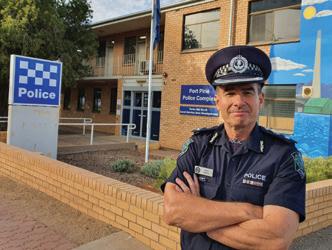

“When it comes to police work no two days are the same. Officers can be
searching for a missing person, attending high-risk jobs, investigating volume crime or policing the vast rural roads within the LSA.”
Yorke Mid North LSA has a strong focus on probationary constables, with many officers spending the formative years of their career in Port Pirie. Having spent nearly half of his 42-year career in regional and remote policing, Superintendent Syrus has the knowledge and experience to mentor the next generation.
“Working in regional areas early in my career allows me to relate to the new probationary constables and share my experiences while providing them with the best opportunities to develop into valuable members of SAPOL,” he said.
“We have a relatively junior workforce, particularly in Port Pirie, so there is a steep learning curve for

> REGIONAL PROFILE
8 BLUEPRINT ISSUE 2 ~ 2022
Superintendent Mark Syrus outside Port Pirie Police Complex.
probationary constables. We ask them to roll up their sleeves and be prepared to work hard from day one.
“I am continually impressed with their enthusiasm and willingness to learn.”
There are currently 18 probationary constables located between Kadina and Port Pirie which equates to 31 per cent of the LSA’s current patrol staff. One of those is Probationary Constable (PC) Kyri Karagiannis who commenced her first posting in Port Pirie in July 2021 after graduating from the Police Academy.


She is relishing the opportunity to gain experiences and take on responsibilities that are not often available to her metropolitan counterparts.
“Due to the limited resources in country policing we do a lot of the ground work for large scale
jobs and also engage in plain clothes policing and custody management,” PC Karagiannis said.
“I’ve been involved in pursuits, foot chases and serious criminal trespass crime series across the LSA. I’ve also had the opportunity to be part of larger operations involving a multi-resource response.”

This includes Operation Strike, the LSA’s strategy for disrupting and reducing the demand and supply of illicit drugs in the region.
“I participated in the Port Pirie ‘day of action’, a key part of Operation Strike where police work closely with other government agencies to impact the illicit drug trade and make it more difficult for drug dealers to do business,” PC Karagiannis said.
When not immersing herself in the many on-thejob learning opportunities, PC
Karagiannis enjoys day trips and camping adventures with her dog. She also competes in powerlifting. Striking the right work/life balance is crucial for success, as is working with a supportive team.
“The Port Pirie team is great. Everyone is approachable and I get to liaise with all the different divisions in person,” she said.
“Being in a relatively junior team means you often get thrown in at the deep end and have to learn very fast.
“The range of jobs we experience, along with the versatility, will be invaluable when applying for specialist areas in the future.”
BUILDING A FUTURE
Constable Alexandra Kraemer is still enjoying life in Yorke Mid North LSA five years after being posted to Port Pirie following her graduation.
“I was originally balloted out of the hat to go to Port Pirie and it has been the best thing that could have happened for my career and for me personally,” she said.
“I have had the opportunity to relieve as Brevet Sergeant and Sergeant on a patrol team for over two years and relieved as Officer
MAIN PHOTO and TOP: The panoramic beauty of Yorke Mid North LSA. Photos: Senior Constable Adam Meyer.
9 BLUEPRINT ISSUE 2 ~ 2022
a vast geographical area of around 35 000 square kilometres,
Service
offers
in its climate,
and policing requirements.
ABOVE: Probationary Constable Kyri Karagiannis. Photo: Brevet Sergeant Tammi Clifford.
Spanning
Yorke Mid North Local
Area
diversity
people, industries, agriculture
in Charge in outstations such as Jamestown and Peterborough.
“I have also undertaken a three-month secondment as a detective in Criminal Investigation Branch and completed the Detective Training Course.”
Working in Yorke Mid North LSA has given Constable Kraemer the chance to excel and learn quickly in a range of different areas.
“I have been the investigating officer for multiple drug transit route operations and drug warrant applications and investigations,” she said.
“I have also been heavily involved with the investigation of an attempted murder, murder and child sex offences.
“With country policing you can be more proactive and develop your street smarts to a high standard.”
Constable Kraemer sees the lifestyle and friendly community as major attractions.
“Port Pirie is only a two-and-a-half hour drive to Adelaide, and with the Flinders Ranges and Yorke Peninsula within a few hours’ drive it makes the lifestyle very attractive to those who enjoy exploring,” she said.
“A huge benefit of living in Port Pirie is that you get to know people easily and can
quickly become part of the community. I play basketball, netball and football for local clubs in Port Pirie and Crystal Brook so that has definitely helped with that aspect.
“My partner has also become heavily involved in the community. He is a teacher at a local school and absolutely loves it here.
Moulding a long-term career
“We recently built a house in Port Pirie so we intend on staying here for the immediate future as it’s great for our careers and the lifestyle is so easy going with work, sports and the shops all within a 10-minute drive.”
Brevet
Sergeant Stephen Moulds is a veteran of regional policing having lived and worked in Ardrossan for the past 22 years after previously spending a combined nine years working in Millicent and Mount Gambier on the Limestone Coast.
The Officer in Charge of Ardrossan Police Station was initially drawn to the town by a desire to work in a one-person station. Four years later it became a twoperson station. Now in his 37th year with SAPOL Brevet Sergeant Moulds still relishes country policing, particularly the freedom to do his own investigations.
“Taking the initial call and following the investigation through to the final outcome is satisfying,” he said.
“I also appreciate the flexibility that rostering provides. I have every second weekend off and don’t work nightshift unless there’s a specific purpose.
“The Yorke Peninsula is a highly popular tourist destination with many holiday homes so I get to meet a broad range of people. I also work closely with helpful local emergency services volunteers and have supportive farmers and community members who make my policing job easier.”
With a population of around 1100 people and renowned for its fishing, beaches and laidback lifestyle, Ardrossan seems like the perfect place to work, however policing here still has its inherent challenges.
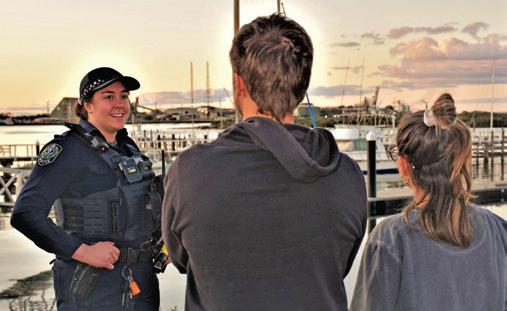
“Working in small
communities can be demanding, with locals often asking me work-related questions while I’m off duty. Gossip can be another issue, so the privacy of community members’ enquiries is very important,” Brevet Sergeant Moulds said.
“Dealing with deaths is also difficult as I often attend fatal incidents where I know the deceased and/or their family.
“Another challenge is taskings involving mental health issues which can be complex and time consuming due to resourcing issues at regional hospitals.”
Despite these complexities, Brevet Sergeant Moulds highly recommends country policing. He believes the secret to success is becoming involved in the community.
“The benefit of being
engaged in community activities is that most people in regional areas support police officers and enjoy having them involved in things outside of their work environment,” he said.
“My family easily adapted to life in Ardrossan as our two sons went to the local school and we were all heavily involved in sport. I played tennis and have coached football teams ranging from under-10 through to A-grade and was an assistant coach for the Woodville-West Torrens country under-17 team.
“Now that I’m older I’m becoming more interested in fishing and gardening and just enjoying the work/life balance as I see out the last few years of my career in Ardrossan.”
BLUEPRINT ISSUE 2 ~ 2022 10
> REGIONAL PROFILE: YORKE MID NORTH LSA
Constable Alexandra Kraemer chats with community members in Port Pirie. Photo: Brevet Sergeant Tammi Clifford.
Now in his 37th year with SAPOL Brevet Sergeant Moulds still relishes country policing, particularly the freedom to do his own investigations.

11 BLUEPRINT ISSUE 2 ~ 2022
Brevet Sergeant Stephen Moulds outside Ardrossan Police Station. Photo: Senior Constable Adam Meyer.
Picture perfect
Located on the southern Yorke Peninsula, Yorketown has been home to Senior Constable Adam Meyer for the past nine years after moving from Port Augusta.

“In my three years working in Port Augusta I had the opportunity to relieve at ‘Clause 14’ police stations in Quorn, Hawker, Leigh Creek, Yunta and the APY Lands and enjoyed the experience,” he said.
“As a family we looked into many country police stations to transfer to but chose Yorketown as it’s a twoperson station and a great location and community in which to establish ourselves.
“Yorketown is close to stunning beaches, numerous jetties and boat ramps as well as one of the best national parks in South Australia.

“I can walk to work, enjoy cheaper housing, and perform
a job where I have a direct impact on the safety of the community I live in.”
The nature of country policing has enabled Senior Constable Meyer to gain exposure to major indictable investigations, from first response to charging and follow-ups, and also provided him with opportunities to handle significant and varied forward command situations.
“I have been involved in large scale missing person search and rescues, drownings, serious vehicle collisions, high-risk incidents, large drug crops and a major bushfire,” he said.
“During the 2019 bushfire season I attended 10 bushfires in a fortnight with the Yorketown bushfire being declared a disaster after destroying homes and infrastructure.
“Local police were involved in the initial event,
investigations and the longterm recovery effort.
“Yorketown police have also conducted extensive coronial investigations into multiple drowning deaths in Dhilba Guuranda – Innes National Park.”
When not performing proactive community policing, the father of two teenagers can often be found traversing the Yorke Peninsula pursuing his passion for photography.
“My daughter Bel and I showcase our work on Facebook and Instagram and I recently helped establish the Southern Yorke Peninsula Photography Club,” Senior Constable Meyer said.
“Taking time out to capture the imagery of this amazing region is a great way to unwind from the pressures of work.”
> REGIONAL PROFILE: YORKE MID NORTH LSA
The winding road along the coast of Dhilba Guuranda –Innes National Park. Photo: Shutterstock.
12 BLUEPRINT ISSUE 2 ~ 2022
TOP: Senior Constable Adam Meyer. Photo: Bel Meyer.
As a family we looked into many country police stations to transfer to but chose Yorketown as it’s a two-person station and a great location and community in which to establish ourselves.
PSO CAREER TAKES FLIGHT
“The amount of respect that was shown for Bogdan by his family, work colleagues and the public was indescribable. This admiration and the devastation felt by everyone who knew him inspired me to one day follow in my godfather’s footsteps and pursue a career with SAPOL,” he said.
“Bogdan showed kindness, respect and empathy towards members of the public who were in need of support and guidance.
“His death was heartbreaking, yet it motivated me to be in a career where I can positively impact people’s lives in a similar way to how he did.”
time he was honing his skills as an accomplished figure skater, with the highlight being a gold medal win in the pairs division at the 2016 Australian National Figure Skating Championships. This was the pinnacle of a figure skating career that had humble beginnings.
“I was a volunteer at the Ice Arena for most of my teenage years, helping people learn to ice skate during public sessions and assisting them when they fell,” PSO Milano said.
Twenty years ago Senior Constable Bogdan Sobczak tragically died when his police motorcycle collided head-on with a motor vehicle in the Adelaide Hills. The death of the popular traffic policing veteran is forever etched in the memory of many within SAPOL, particularly Police Security Officer (PSO) Josef Milano,
for whom the loss was both devastating and motivational.
Senior Constable Sobczak was a 52-year-old married father of four children and also godfather to PSO Milano who was just 15 years old at the time of the tragedy.
“Bogdan was a close family friend and a very kind and caring man,” PSO Milano said.
“He was highly respected and valued by both his work colleagues at Holden Hill Police Station and the community.”
Senior Constable Sobczak was farewelled at a police funeral. This was a defining moment for PSO Milano.
PSO Milano graduated from the Police Academy in January 2022, however his pathway from inspired teenager to SAPOL employee took several detours along the way as he embraced other career options and sporting pursuits.

PSO Milano spent more than a decade working in the airline industry, culminating in a role as Airport Operations Manager for Air New Zealand in Melbourne. At the same
“The Ice Arena quickly became a second home and a comfort zone. I then started figure skating classes, got my own coach, and began competing in men’s singles figure skating and in 2007 I scored a spot in an ice show in Singapore.”
The skilled figure skater enjoyed the physical and mental challenges of the intense sport.
“Some days the challenge was the physical aspect of mastering the move and other days it was overcoming the fear of falling,” PSO Milano said.
Champion figure skating pair Josef Milano and Lauren Moore.

BLUEPRINT ISSUE 2 ~ 2022 13
PSO Josef Milano.
Photo: SAPOL Photographic Section.
> OUR PEOPLE
PSO Milano’s gold medal win in 2016 was the culmination of many months of early morning training sessions on the ice, personal training for strength and conditioning, and dance classes to learn choreography and rhythm. A year later he decided to put his figure skating exploits on ice when he relocated to Melbourne to pursue his airline career.
With the COVID-19 pandemic impacting the airline industry, and a desire to return to Adelaide, PSO Milano knew it was time to realise his long-held dream of working for SAPOL. He is now thoroughly enjoying life as a PSO working at Government House, after stints on patrols and at COVID medi-hotels.
“I enjoy the freedom and independence of working solo and being able to take ownership of the role,” PSO Milano said.
“PSOs rotate through various sites, each with their own site specific duties and challenges, and each roster rotation we have an opportunity to cover shifts at other static sites or patrols. This keeps the role interesting and ensures our skills continue to develop.”
With his ice skating days behind him, PSO Milano is now embracing his passion for group fitness. As a certified instructor he can often be found at gyms running intensive Body Combat and Step classes. He believes fitness plays a huge part in the PSO role.
“On my first shift after graduating from the Police Academy I engaged in a foot chase, attempting to capture people who were absconding from a medi-hotel,” he said.
“Despite my high level of fitness, I felt breathless and exhausted. The outcome may have been different had I not maintained my training.
“Group fitness and ice skating have built up my physical endurance but my airline experience taught me valuable skills in customer service, communication, troubleshooting and resilience that I am now drawing upon in my PSO role.
“Being a clear communicator is particularly important when interacting with people daily and especially when trying to de-escalate situations with offenders.”
PSO Milano is thriving in his new career path and hopes to emulate his late godfather by making a strong contribution to the community in a long and successful career with SAPOL.
“It’s an exciting time to be a PSO with Police Security Services Branch expanding and a new rank structure which has opened up the potential for promotion and career progression within the PSO role,” he said.

14 BLUEPRINT ISSUE 2 ~ 2022
> OUR PEOPLE: JOSEF MILANO
Group fitness and ice skating have built up my physical endurance but my airline experience taught me valuable skills in customer service, communication, troubleshooting and resilience that I am now drawing upon in my PSO role.
PSO Josef Milano monitors activity at Government House.
Photo: SAPOL Photographic Section.

15 BLUEPRINT ISSUE 2 ~ 2022
AN EVOLVING
activity, however the public nature of most digital currency transaction data creates opportunities to identify, target and disrupt criminal activities using this technology.
a risk for the facilitation of serious crimes,” Detective Sergeant Burke said.
“It is a digital asset that can circulate without the centralised authority of a bank or government.
However, it can be highly volatile, inherently risky and complex, with digital currencies fast becoming the preferred choice for criminals involved in money laundering, investment scams, ransomware, funding terrorism and cybercrimes.

Cryptocurrency is seen as an emerging threat amid a rise in criminal
Detective Sergeant Martin Burke from Cybercrime Investigation Section is at the forefront of investigations, training and collaborating with policing jurisdictions across Australia as police try to keep pace with the rapid evolution of digital currencies.

“Cryptocurrency is entrenched in legitimate transactions and investments, with a high percentage of daily cryptocurrency transactions being legitimate, however its pseudo-anonymous and borderless nature presents
“The use of cryptocurrency in unregulated networks allows anyone to transfer value to the other side of the world in a matter of minutes and not have the transaction flagged or identified by traditional regulatory mechanisms.
“That is part of what makes it so attractive to criminal syndicates.”
While cryptocurrency is anonymised, it’s not necessarily anonymous. Each cryptocurrency transaction is recorded on a public ledger called the blockchain which contains data such as the

time/date, amount spent and the wallets involved in the transaction. While there is no identification information attributed to the blockchain data, these transactions can pass through a Digital Currency Exchange, which could be likened to a traditional bank.
The way cryptocurrency trading works makes it easy for people to hide their identity. This has given rise to more sinister uses of the technology, with cybercriminals taking full advantage, targeting unsuspecting victims with a variety of scams including romance, investment, give away and job/employment scams. ‘Crypto-jacking’ has also been identified, with websites established to trick people into using their computers’ and mobile devices’ processing power to mine cryptocurrency against the user’s will.
> CRIME TREND 16 BLUEPRINT ISSUE 2 ~ 2022
In recent years cryptocurrency has experienced a considerable increase in value and acceptance, with Australians quickly adopting this new technology.
Detective Sergeant Martin Burke. Photo: SAPOL Photographic Section.
According to Scamwatch, Australians lost over $158 million to investment scams in the first five months of 2022, with $113 million of these losses involving cryptocurrency investments.

Cryptocurrency is also the most common payment method for investment scams.
“Scammers have turned to cryptocurrency as the technology is fashionable and poorly understood, with its complexities confusing many investors and making them more vulnerable to scams,”

Detective Sergeant Burke said.
“The advent of COVID has created vast opportunities for scammers to enhance their social engineering of people and exploit the digital environment, with people more isolated and immersed in technology than ever before.”
Of the scam incidents reported to SAPOL during the 2021-22 financial year, around 77 per cent were crypto investment scams with a total reported loss of $11.7 million.
“While these scams may be a developing issue, the methods employed by scammers have been around for a long time but have now undergone a ‘crypto facelift’,” Detective Sergeant Burke said.
BECOMING COMMON CURRENCY

Cryptocurrency is also becoming more prevalent in asset seizures from serious crime investigations. In 2021 Operation Ironside uncovered multiple cryptocurrency holdings including one senior crime figure who had their $250 000 investment frozen by police. More recently two people were sentenced for their role in a multi-million dollar darknet drug syndicate which uncovered a significant amount in digital currencies.
“Operation Gateway discovered around $900 000 in Bitcoin and Monero, a privacy coin common on the darknet, making it SAPOL’s largest ever cryptocurrency seizure,” Detective Sergeant Burke said.
The sheer scale of this offending indicates the challenges facing law enforcement agencies across Australia. SAPOL has experienced a surge in reports of deceptions involving cryptocurrency, with 483 recorded in the 2021-22 financial year, up from 16 in 2018-19.
“This is more than one a day being reported, with cryptocurrency deceptions now accounting for seven per cent of the overall deceptions reported to SAPOL,” Detective Sergeant Burke said.
“We have found 47 different types of cryptocurrency from the 83 seizures conducted in the past two years, with the seizures ranging from a couple of thousand dollars to the Operation Gateway seizure of $900 000.
“Due to cryptocurrency’s volatility it is difficult to put a dollar figure on the amount seized to date but it would be approximately $1.75-2 million at the time of seizure.”
17 BLUEPRINT ISSUE 2 ~ 2022
Financial and Cybercrime Investigation Branch (FCIB) has developed and implemented processes and capabilities to deal with the increasing exposure to digital currencies. There is also a focus on building a dedicated group of staff with the necessary cryptocurrency skillsets to navigate this constantly evolving environment.
“We currently have a collaborative approach across the branch with Digital Evidence Section handling the exhibits and Confiscation Section responsible for the majority of seizures,” Detective Sergeant Burke said.
“FCIB owns the strategic aspects of cryptocurrency investigations, but operationally everyone is getting jobs related to it. This financial year we’re expecting around 700 - 800 occurrences with an element of cryptocurrency in it.
“We will soon be implementing a trial of a Cyber Issues Reporting System team which will see team members receiving specialised training in financial and cybercrime investigations, including an ability to trace cryptocurrency.”
KNOWLEDGE IS POWER
Detective Inspector Pete Wirth, Acting Officer in Charge of FCIB, believes training is vital in empowering staff with the extensive knowledge required to tackle a rapidly changing digital landscape.
“FCIB is always seeking opportunities to develop our team members’ expertise in cryptocurrency, be it digital forensics, cryptocurrency tracing and analysis, forensic accounting or investigation,” he said.
“Our investigators have attended several information sessions conducted by NSW Police and the Basel Institute, with other training and educational initiatives currently being developed.
“In June we had a number of investigators complete an online cryptocurrencies and money laundering training program alongside investigators from law enforcement agencies around the world. This is a global issue and requires global partners to be able to combat the associated crime.”
Collaboration and stakeholder engagement is important. In September 2022
Detective Sergeant Burke joined with two members of the NSW Police Cybercrime Squad to convene the inaugural Crypto Practitioners Forum in Sydney. The twoday forum saw a gathering of subject matter experts, police teams specialising in cryptocurrency investigations, along with industry partners, to discuss issues, trends, training, governance and challenges. Attendees, included the FBI, AUSTRAC, Australian Taxation Office, USA Internal Revenue Service, and major national and international Digital Currency Exchanges.
“The idea was to inform, network and collaborate,” Detective Sergeant Burke said.
“This type of engagement is crucial, particularly in developing relationships that are invaluable in cryptocurrency and cybercrime investigations.”
Collaboration and education will continue to be essential as police grapple with challenges such as encryption, anonymising technology, analytical capacity and investigator training. However, the biggest hurdle appears to be legislation that has failed to keep up with technology.
“We are dealing with digital currency in a digital world yet the legislation and regulations are still based on tangible property,” Detective Sergeant Burke said.
“The cryptocurrency market is unpredictable and quickly evolving therefore it requires strong and adaptable legislation.”
Investing in cryptocurrencies is still a novelty in Australia, with around 1 in 20 adults currently owning at least one cryptocurrency. However, there is potential for massive growth in the future as more Australians become exposed to this type of investing.

“The inclusion of cryptocurrency in future point-of-sale, ATMs and online transactions, which we’re already beginning to see now, will accelerate this growth,” Detective Sergeant Burke said.
“This will continue to present challenges as we strive to meet the demands of increased offending involving digital currencies while building awareness and education of this form of cybercrime both within SAPOL and the community.”
BLUEPRINT ISSUE 2 ~ 2022 18
> CRIME TREND: CRYPTOCURRENCY
Cryptocurrency explained
• Cryptocurrency, or crypto, is a digital form of currency that does not rely on regulating authorities or banks. It uses encryption to verify transactions, which makes it extremely difficult to counterfeit. Crypto uses a decentralised system to record transactions and issue new units, called ‘coins’ or ‘tokens’.

• Cryptocurrencies are distributed on a public ledger called the blockchain, which is a record of all transactions updated and held by currency holders that is secure and encrypted.
• Cryptocurrency is not tangible. Owners have digital wallets which contain keys or passwords. Crypto
holdings can only be accessed using private keys.
• To date, there are 21 750 cryptocurrency projects that represent the entire US$852 billion crypto market. The most well-known is Bitcoin, which was established in 2009 as the first cryptocurrency. It has skyrocketed in value


from US$500 in May 2016 to around US$17 000 in December 2022. Bitcoin has a current market capitalisation of about US$328 billion, more than double the second largest, Ethereum with US$160 billion.
BLUEPRINT ISSUE 2 ~ 2022 19
In late 2018 SAPOL’s Cybercrime Investigation Section began investigating the suspected money laundering of cryptocurrency. Fast forward to February 2020, three offenders were in custody after siphoning around $18 million from thousands of victims in a targeted, highly sophisticated and organised ‘hacking’ scheme. This elaborate 18-month fraud spree became the largest cybercrime investigation SAPOL has ever been involved in.

HACKERS PAY THE PRICE
Police discovered Jones was not working alone. He had found two willing accomplices in Adelaidebased couple Jason Brian Lees and Emily Jane Walker.

20 BLUEPRINT ISSUE 2 ~ 2022 > OPERATIONS
Initial enquiries centred on Adam David Jones, an offender well-known to SAPOL. He had already served a prison sentence after a fraud conviction in 2014 following an 18-month suspended sentence in 2012 for 74 counts of fraud.
In 2018 Jones purchased network administration rights from the dark web and then used this access to begin exploiting the financial and personal information of businesses across Australia.
In June 2019 SAPOL initiated Operation Captcha, with NSW Police commencing their joint investigation two months later with Strike Force Cedrilla.
Police discovered Jones was not working alone. He had found two willing accomplices in Adelaidebased couple Jason Brian Lees and Emily Jane Walker. Soon after being released on parole, Jones had begun communicating with Lees over the internet. Although they met online, they lived a short distance apart. The trio wasted no time embarking on a highly-lucrative scam that was staggering in its scale.
Detective Sergeant Sam George from Cybercrime Investigation Section was the investigation supervisor for Operation Captcha.
“We began monitoring Jones after becoming aware of cryptocurrency activity in his name. This led us to Walker and Lees and from there the investigation grew quickly as we began detecting hundreds of victims,” he said.
“Investigators identified Jones was using compromised remote desktop protocol credentials to intrude into the computer networks of various small to medium Australian businesses.
“Once network access was gained, a script was executed to search the payroll system and locate the file containing instructions for banking payments.
“The file was altered to replace legitimate banking
details of employees with details of fraudulent ‘mule’ bank accounts, resulting in payroll payments being processed into the mule accounts controlled by the offenders.
“Once this was completed, the offenders would change the payroll data back to the way it had been. When employees enquired about not being paid, the business would be confused as they’d be looking at a perfectly normal payroll spreadsheet.”
The initial investigation identified two victims – a school in New South Wales and a construction company in Victoria, losing $40 000 and $180 000 respectively.

“Money was funnelled from those two companies and put into mule accounts that were in the names of people whose identities had been stolen,” Detective Sergeant George said.
“This money was diverted to other fake accounts or withdrawn through ATMs.”
FOLLOWING THE MONEY
As more businesses fell victim to this sophisticated scam, the investigation rapidly expanded, with staff from Digital Evidence Section and Confiscation Section, along with forensic accountants and NSW Police all becoming intensively involved. This joint effort
unearthed information that Jones had not been working alone.
“We identified activities in Seaton and neighbouring areas where credit cards associated with the mule bank accounts were being delivered,” Detective Sergeant George said.
“These were mainly vacant premises within a fivekilometre radius of Lees’ and Walker’s home address.
“CCTV captured at various locations showed Walker accessing some of the mule accounts.”

The credit cards were a result of the hacking trio’s appetite for harvesting personal identifiable information from the networks they intruded. Unbeknown to employees of the compromised businesses, their driver’s licences, Medicare numbers, addresses, mobile phone numbers, bank accounts and superannuation numbers were all swiped.

“Jones, Lees and Walker set up hundreds of accounts in the names of real employees which were used to receive stolen funds. They also used the personal details to create fake phone accounts and order credit cards,” Detective Sergeant George said.
“A mobile phone linked to Walker and hundreds of disposable SIM cards were used to open the accounts.
“Victims’ information was also exploited to make superannuation payouts and fraudulent tax returns from their MyGov accounts, with funds channelled into the established mule bank accounts.
“Walker used her bookkeeping skills to maintain thousands of spreadsheets charting the accounts, deposits and withdrawals.”
Some of the credit cards were used to fund private servers and cloud storage where the trio stored vast quantities of illegally obtained data in order to share with each other remotely. This data could also be sold onto third parties via the dark web in similar fashion to how Jones initially purchased the business network administration credentials.
“When we successfully obtained court orders and warrants to enable access to this cloud storage, we found hacking tools, examples of the script used to redirect funds and thousands of examples of private information,” Detective Sergeant George said.
“We also uncovered crypto wallets used to access the accounts from any location and aid money laundering. One of the wallets contained more than $18 million in transactions from that wallet and multiple withdrawal points.”
21 BLUEPRINT ISSUE 2 ~ 2022
Jason Lees and Emily Walker. Photo: Facebook.
The trio’s arrests signified the end of an elaborate computer hacking scheme that targeted the payroll systems of at least 23 organisations and companies.
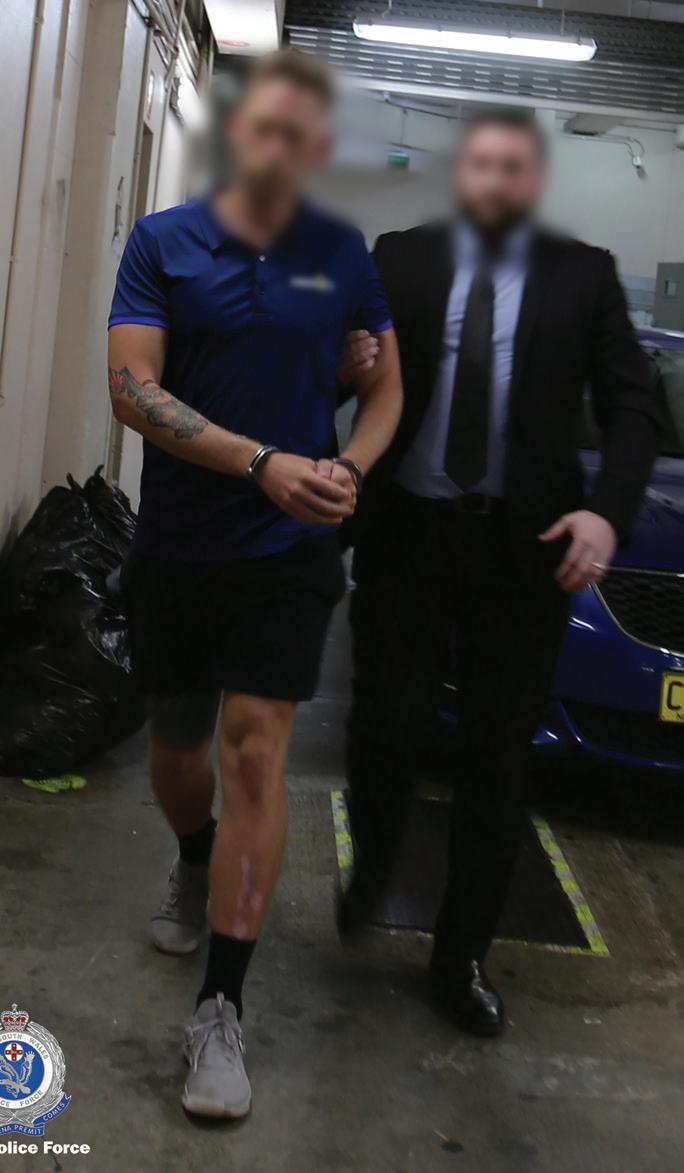

22 BLUEPRINT ISSUE 2 ~ 2022 > OPERATIONS: OPERATION CAPTCHA
Adam Jones is arrested by a member of Strike Force Cedrilla. Photo: NSW Police Force.
HACKERS HELD TO ACCOUNT

On 13 January 2020 police conducted searches on the home address of Lees and Walker where they seized large quantities of computers and electronic devices.
On 5 February 2020 police returned to the same address and arrested the duo.
“A further search of the premises identified that Lees and Walker had re-established their home network system since police had disassembled it in January,” Detective Sergeant George said.
“Data analysis of the seized exhibits identified a large quantity of stored personal identifiable information, remote desktop protocol credentials and numerous spreadsheets.
“These spreadsheets contained thousands of real people’s details including name and contact information, passwords and banking information. They highlighted the magnitude and sophistication of the offending.”
Just a few hours earlier, Jones had been sitting in a small café at the Green Square Library in Sydney preparing for the work day ahead when NSW Police detectives suddenly appeared and arrested him. The trio’s arrests signified the end of an elaborate computer hacking scheme that targeted the payroll systems of at least 23 organisations and companies.
Jones was charged with several fraud and deception offences, with Lees and Walker charged with a range of serious offences focusing on their possession of prohibited material and proscribed data and their use of computers to gain unauthorised access.
The trio’s offending involved a collective figure of more than $12 million.
“Investigators identified tens of thousands of harvested personal identifiable information, thousands of network login credentials and thousands of unauthorised network log-in activities via remote desktop protocol,” Detective Sergeant George said.
“They also found deception on superannuation funds that resulted in a $5 million loss.”
Lees and Walker pleaded guilty to multiple online cybercrime and fraud charges, but only after they viewed a presentation from diligent cybercrime detectives.
“Lees and Walker were quite confident in their sophisticated encryption and planned to plead not guilty, thinking police were unable to decrypt their electronic devices. We arranged a meeting with them and their legal representatives and gave them a presentation showing screenshots of what we had uncovered on their devices. This seemed to shock them,” Detective Sergeant George said.
To the average person it would seem that the motivation for such an elaborate scam would be to finance an extravagant lifestyle. However, during court proceedings in Adelaide and Sydney the trio said they needed to fund methamphetamine, cocaine and alcohol addictions, with Lees spending $1000 a week on methamphetamine.
All three offenders pleaded guilty. Jones was sentenced to 11 years in prison with a non-parole period of six and a half years. Lees, the scam’s ‘architect’ who wrote the computer virus that infected
numerous small businesses, was sentenced to eight years and nearly seven months with a non-parole period of five years. This was later reduced to four years after appealing the severity of the sentence.
Walker received a sentence of four years and just under 11 months with a non-parole period of two years and 10 months. Walker, who moved to Australia when she was aged 14, could be deported to the United Kingdom upon her release.
Detective Senior Sergeant Adam Serafini, manager of Cybercrime Investigation Section, attributes the successful investigation and custodial sentences to the tenacity of investigators and a collaborative policing effort.
“Were it not for the significant efforts of our cybercrime team, it’s entirely possible that this offending would have gone on undetected,” he said.
“This case is an excellent example of police jurisdictions working together and sharing vital information to ensure that cybercrimes which are committed across our state and territory borders are thoroughly and successfully investigated.
“It also highlights the growing value of data as a resource and the need for individuals and businesses to take the necessary steps to protect their data and identity.”
For valuable tips and information about how to protect yourself from scams and cybercrime, visit police.sa.gov.au/your-safety/ scams-and-cybercrime.
23 BLUEPRINT ISSUE 2 ~ 2022
A MARK OF RESPECT
Police
a richly deserved honour for Superintendent Syrus who was nominated by Operation Flinders Foundation Chief Executive Officer David Wark.
and developing their personal values of self-esteem, motivation, resilience, leadership and teamwork.
The annual award, sponsored by the Rotary Club of Unley, honours the outstanding commitment of a police officer serving the community, with nominations only accepted from the general public. It is
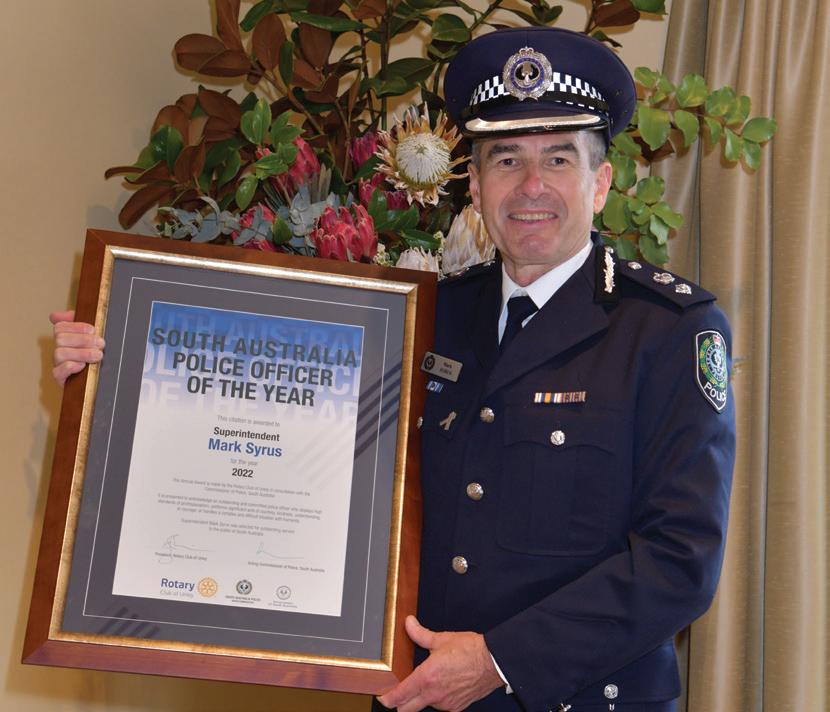
Since 1996, the policing veteran has been a volunteer with Operation Flinders, a program designed to build engagement, resilience and wellbeing for ‘at risk’ youth through physical challenges such as trekking, navigation, bush skills and camping. Superintendent Syrus has played a pivotal role in transforming the lives of thousands of young people through his guidance and support. His leadership, experience and compassion has been integral in rebuilding program participants’ self-confidence
For Superintendent Syrus, winning this prestigious award is a humbling experience.
“As a police officer, there can be no greater reward than being acknowledged for your efforts from the community that we serve,” he said.
“Volunteering is about giving, contributing and helping other individuals and the community. It is working with others to make a meaningful contribution to create a better community.”
During his 26 years with Operation Flinders, Superintendent Syrus
has performed the role of Exercise Commander where he has demonstrated leadership and professionalism in safely conducting a program where he is often accountable for more than 140 young people and adults. He has also assumed the extremely challenging role of team leader on 27 exercises, where he has worked directly with young people, guiding them on their arduous eight-day trek of up to 100 kilometres over rugged terrain in the Flinders Ranges. This involves participants sleeping rough, cooking on an open fire, and experiencing Indigenous culture. As team leader he has also performed the role of abseiling instructor, boosting
BLUEPRINT ISSUE 2 ~ 2022 24
An unwavering commitment to serving the community and improving the lives of young people has seen Superintendent Mark Syrus awarded South Australia
> COMMUNITY ENGAGEMENT
Officer of the Year.
young people’s ambition and confidence by encouraging them to achieve something many of them believed was improbable.
“I have been fortunate enough to find a way to contribute to the youth of South Australia through Operation Flinders,” Superintendent Syrus said.

“By temporarily disconnecting participants from modern society pressures, it provides for reflection and the building of self-confidence through new experiences and being challenged in a safe and supportive environment.
“It has been extremely rewarding to transform the lives of young people by building their confidence and people skills through positive experiences and helping them grow to become valued members of the community.”
In addition to his significant contribution to volunteering, Superintendent Syrus has delivered 42 years of continuing service in frontline policing, specialist roles, supervisory and management positions, along with service to country communities. The current Officer in Charge of Yorke Mid North Local Service Area (LSA) has spent nearly half of his career working in regional and remote areas of the state, a journey that began
shortly after his graduation in 1980 when he was posted to Port Augusta.
“I remember sitting in the Region B (now Eastern District) parade room where the Duty Inspector asked for a volunteer to transfer to Port Augusta reliefs, indicating that if there was no volunteer by lunchtime then he would pick someone. No-one volunteered and I cleaned my locker out at the end of the shift,” he said.
“From there I embarked on an exciting and varied policing career and over the next four years I basically lived out of a suitcase relieving throughout
the far north of the state before taking a permanent role as Officer in Charge at Andamooka.”
In 1989, Superintendent Syrus joined STAR Operations, serving with distinction as a team operative, police diver and supervisor over a 12-year period before returning in 2014 as Officer in Charge. He also excelled in his subsequent role as Officer in Charge of Communication Centre where he was integral to the successful implementation of the Communications Support Model which established the Investigation Support Desk and State Crime Assessment Centre.
During his extensive career Superintendent Syrus has led by example in performing commander roles during highly complex and potentially dangerous incidents such as sieges, riots, bushfires, floods, aircraft crashes, high speed pursuits, and the search and recovery of murder victims.

“In STAR Operations I was involved in a number of complex, significant and hazardous incidents, including a siege at Nuriootpa involving the shooting of a police officer, and underwater and ground searching for the missing Beaumont children
“Returning to STAR Operations as Officer in Charge was a huge honour.”
Superintendent Syrus’ distinguished career has now come full circle, with his passion for country policing evident as the Officer in Charge of Yorke Mid North LSA where he is responsible for 138 staff spread across 32 policing districts.
“Country policing holds a place in my heart. What I enjoy most about it is the ‘can do’ attitude of staff and the connection with the community,” he said.
“It can often be a challenging environment, with limited resources and the need for lateral thinking to provide a service to the community. In the country you can see the results of your police work, with strong community relationships being vital to achieving our objectives.”
OPPOSITE PAGE:
BLUEPRINT ISSUE 2 ~ 2022 25
and Rhianna Barreau,” Superintendent Syrus said.
Superintendent Mark Syrus leads a group of youth from Operation Flinders.
LEFT: Superintendent Syrus during his STAR Operations days.
Superintendent Syrus with his richly deserved award. Photo: SAPOL Photographic Section.
NEW STATION STREETS AHEAD OF THE REST
People visiting the station will feel safe and welcomed in a more open and modern front counter area. They will also be able to access police services both online and in-person.
OPPOSITE

26 BLUEPRINT ISSUE 2 ~ 2022
> NEW INITIATIVES
Senior Constable First Class Kate Longden and Probationary Constable Sagan North outside Hindley Street Police Station. Photo: SAPOL Photographic Section.
PAGE: Superintendent Matt Nairn discusses the station’s CCTV capability with Commissioner Grant Stevens, Probationary Constable Jemima Walsh and Constable Cain McDonald. Photo: Kelly Barnes Photos.
For most people, visiting a police station is not on their bucket list and is usually a task undertaken out of necessity. However, the new Hindley Street Police Station may change that, with its contemporary look and feel providing a welcoming space for the public while setting a new benchmark in police station design.
The new station is located on the corner of Hindley and Leigh streets, around 100 metres down the road from the previous station that served Hindley Street well for the past 17 years. Located amidst Adelaide’s premier entertainment precinct, the station is open 24 hours per day, seven days a week, with patrols able to be deployed in vehicles, on foot and on bicycles and e-scooters.
Officer in Charge of Eastern District, Superintendent Matt Nairn sees the station’s location as a major asset.
“The new station is in a
highly visible and accessible location, amongst an active night life and heavy foot and vehicle traffic,” he said.
“People are able to easily find assistance when they need it and our officers can respond from a central site.
“This new facility is crucial for enhancing community safety due to the strong, active and visible police presence it creates in the city.”
The new building has been designed fit for purpose for SAPOL staff and visitors, providing a modern, contemporary and accessible space for people to attend whenever they require police assistance. It is also the first station to incorporate the new SAPOL branding and vision for ‘Safer Communities’.
“Considerable planning has gone into the set-up of the customer service and interview room areas as well as the patrol office and equipment storage areas,” Superintendent Nairn said.
“People visiting the station will feel safe and welcomed in a more open and modern front counter area. They will also be able to access police services both online and inperson.”
Hindley Street Police Station sets a new standard when it comes to staff amenities, with bike storage facilities, contemporary kitchen and dining areas,
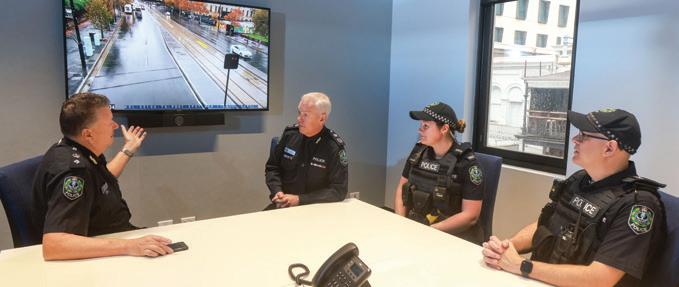
showers, and improved security measures for staff. It also caters for storing multipurpose load bearing vests and features a purpose built equipment room that takes into account the complexity of the equipment issued to police daily.
Having worked at the old Hindley Police Station for around 10 years, Senior Constable First Class Kate Longden is well aware of the vast difference
“The new station is the best, most modern and patrol friendly building I have worked in,” she said.
“The huge equipment room and the new kitchen and shower areas are fantastic. There are also heaps of computers to get paperwork done and plenty of car parks for police vehicles.
“My colleagues and I are constantly singing the praises of the new station and consider ourselves lucky to work here. We have many visitors from other SAPOL areas who drop by to check out the new facilities and their response is overwhelmingly positive with some expressing jealousy about our great work environment.”
SAPOL staff played an integral role in designing the station’s layout. Sergeant Andrew Leigh is now experiencing the benefits of this involvement.
“I have worked in more than 10 police stations in metropolitan and regional South Australia and can confidently say it’s easily the best station for facilities, layout and ease of use,” he said.
“We can now run large scale incidents from the briefing room with real-time CCTV of the CBD on multiple screens as well as accessing police systems.
“We also have more CCTV screens to monitor events in the city and respond appropriately which improves response times and enhances community safety. Our station and vehicles are now in a better location which helps with responding to licensed premises in the vicinity.”
Sergeant Leigh is a fan of the station’s high visibility and the more welcoming front counter area, but it’s the positive impact on the workplace that he’s really impressed with.
“The new station has improved staff morale considerably. At times Hindley Street can be a difficult location to work at for a variety of reasons but providing staff with a new, modern work environment makes it more pleasant and a bit easier for us to do our job,” he said.
BLUEPRINT ISSUE 2 ~ 2022 27
A POSITIVE PRESENCE
Located in the far north-west of South Australia, the Anangu Pitjantjatjara Yankunytjatjara (APY) Lands is an extremely remote area spanning around 103 000 kilometres. This expansive region, roughly as big as Iceland, is home to around 2200 people spread across a number of communities and homelands. It is also home to nine officers from Far North Local Service Area (LSA) along with 33 members of APY Lands Section who are deployed there on a regular basis.
Established as part of State Operations Support Branch (SOSB) in April 2022, APY Lands Section is unique in that members undertake policing roles within the APY Lands communities and within Metropolitan and State Operations Services.
“The team has a fly in, fly out model with members working a three-week roster which includes an eight-day straight deployment to the APY Lands,” said Officer in Charge of SOSB, Inspector Kim Bos.
“When not deployed to the APY Lands, team members assist the State Support Section – the other half of SOSB – by liaising with Districts and LSAs in policing cross-border volume crime, events and other tasks as required.
“It’s a dynamic and challenging role that requires members to develop a strong understanding of Aboriginal culture which is essential to ensuring safer APY Lands communities.”
Having always been interested in remote policing, Senior Constable Travis Thomas jumped at the chance to join APY Lands Section.

“I was keen to gain
an insight into remote policing and experience the challenges of such a unique environment,” he said.
“The policing model is great as it allows me to continue to meet my existing commitments as I’m away for a manageable period of time when deployed.”
Senior Constable Thomas has found that there is no such thing as an average shift on the APY Lands.

“Sometimes I have to deal with incidents involving
violence or displays of aggression and at other times I’m sought for advice as police are the ‘go to’ people due to our high visibility within the APY Lands,” he said.
“People will often approach me to tell me about issues of concern along with positive things that have been happening.
“There is a strong community engagement aspect. I regularly attend schools to give talks, undertake programs with the
BLUEPRINT ISSUE 2 ~ 2022 28
> TEAM PROFILE
MAIN PHOTO and BELOW: Constable Alison Sampson on deployment in the APY Lands.
OPPOSITE PAGE (TOP): Senior Constable First Class Kingsley Smith interacts with children, and below Constable Alison Sampson with the SAPOL aircraft.
Photos: APY Lands Section.
public to enable engagement, and assist other service providers to conduct positive initiatives such as cultural programs, events and sporting activities.
“We have been wellreceived by the local population, with people seeking further involvement with police in community activities and to assist in programs.”
While Senior Constable Thomas enjoys the positive aspects of community policing, there are also the inherent challenges within a sometimes complex environment.
“You cannot operate the same way you do in metropolitan policing. A simple public fight which would result in a quick arrest in the city has a lot more layers to it in the APY Lands due to cultural sensitivities and relationships,” he said.
“As police we need to identify the broader and real issues and speak with the right people to calm the situation and prevent it becoming a larger issue in the future.
“In many matters it’s important to be aware of cultural complexities such
as family structures and the dynamics of gender and age responsibilities.”
Dealing with the distinctive challenges of remote policing can be a personally enriching experience.
“Often the challenges of the job are also rewarding as they keep you thinking and you feel satisfied overcoming them,” Senior Constable Thomas said.
“The APY Lands lifestyle also helps balance out the work demands. I’ve enjoyed experiencing the culture and country, along with the unique aspects like having a barbecue and campfire in your front yard, watching the sunset and having dingoes come into the yard to visit.
“A week later you’re back in Adelaide where you get to undertake policing in the city and at events and then go home and continue your regular life and activities. Working in APY Lands Section gives you the best of both worlds.”
A WELCOME MOVE
For Constable Alison Sampson, joining APY Lands Section seemed like the perfect fit for her both personally and professionally.

“I am a proud Aboriginal woman, a descendant from Jawoyn and Wiradjuri countries, but grew up in the eastern states of Australia. I was keen to work in the APY Lands and learn about another Aboriginal culture while fulfilling my role as a police officer,” she said.
“I have a family with three teenagers so when the new fly in, fly out model was introduced I was excited at the possibility of being able to deploy without the need to uproot my family.”
Constable Sampson is enjoying the role’s variety and has embraced the challenge of adopting differing policing styles for the APY Lands and the metropolitan area.

“In this role you need to adjust your policing style to the situation and location. This requires flexibility, patience and exceptional communication,” she said.
“It challenges you to think outside the square in relation to decision-making and priorities as the same resources are not always readily available in the APY Lands as in the city.
“It’s a diverse and complex role. One week I’m in the APY Lands and the next I’m
undertaking policing duties on Hindley Street or at the football. This may also involve engaging with Anangu people who have travelled to Adelaide from the APY Lands.
“I relish this variety as it keeps me engaged and I am constantly learning and growing in the role. SOSB are not only supportive of our development but ensure our welfare is always at the forefront.”
Working in the APY Lands can be demanding due to the vast geographical area, limited resources, and officers being on-call during their deployment. However, there is plenty of training, assistance and guidance available.
“Far North LSA has established a great network of support and coordination strategies to assist you and you are never on your own,” Constable Sampson said.
“There are four permanent sergeants at each of the primary stations whose wealth of knowledge and experience is invaluable. There are also Family Violence and CIB members based at Umuwa that can assist as required.”
A major attraction of the
BLUEPRINT ISSUE 2 ~ 2022 29
role is the opportunity to create strong connections with communities across the APY Lands. This positive engagement is often invaluable in helping to resolve issues, as Constable Sampson can attest to.
“I was involved in a conference with feuding female members of the community which was causing a lot of tension amongst families,” she said.
“Bringing all the parties together and helping them to work through the issues in a neutral and safe environment had a positive outcome. It
was very rewarding to see the impact of this one small initiative on the people involved and the community as a whole.”
Constable Sampson has wasted no time in getting to know the local population, and has found them to be supportive of the new policing model.
“I love getting out in the community, attending meetings, going to the football, meeting with other service providers and particularly engaging with the children – they often come running up to the police car to
have a chat,” she said.
“Positive engagement and being approachable encourages people to speak with police and builds trust and mutual respect, which in turn helps with delivering police services.
“This interaction is enhanced by the flexibility for members to work at different stations so they get to know all communities and can backfill at any time. There is also accommodation at each station, allowing members to conduct short stays in communities thereby increasing engagement
opportunities.”
Constable Sampson strongly encourages officers to consider a move to the new APY Lands Section.
“The role is challenging and diverse and you will get to see some of the most remote and beautiful parts of Australia,” she said.
“If you are passionate about remote community policing, and don’t mind flying in a small plane, this is the job for you.”
MAIN PHOTO: The vast expanses of the APY Lands.
OPPOSITE PAGE (TOP): Officers attend the cultural awareness training course. Photo: SAPOL Photographic Section.

> TEAM PROFILE: APY
SECTION
LANDS
30 BLUEPRINT ISSUE 2 ~ 2022
A major attraction of the role is the opportunity to create strong connections with communities across the APY Lands.
A culture of understanding
Central to the successful implementation of the APY Lands Section has been a two-day cultural awareness training course for team members. Held at the Police Academy, the course is run by the Iwiri Aboriginal Corporation and Dr Sam Osborne, University of South Australia’s Associate Director, Regional Engagement (APY Lands).
Assistant Commissioner Ian Parrott from State Operations Service believes the training sets a new standard for how SAPOL develops cultural understanding for staff.
“To my knowledge, this is the first time SAPOL has engaged with APY cultural educators to undertake a course to enhance the cultural and language understanding of police who are being deployed into a unique Aboriginal cultural

environment,” he said.
“The course is very immersive and hands-on and has a strong focus on history, culture, tradition and language, with Anangu people engaging with participants throughout the two days.

“This is a positive initiative that will better integrate police into the APY Lands and empower our people to work more cooperatively with remote Aboriginal communities.”
Constable Alison Sampson believes the training is a fantastic opportunity for officers to learn about the APY culture before they set foot in the APY Lands.
“It provides an understanding of the Anangu history and some insights into their cultural traditions and practices so that members don’t unintentionally offend
anyone and can show the respect required.
“We were able to learn some of the language, in particular some key phrases that help break the ice and start a conversation which I believe has been of benefit in connecting with the community.”
Senior Constable Travis Thomas also found the training beneficial.
“Improved cultural knowledge aids understanding of why things may be happening, along with internal community structures, sensitivities and appropriate ways of policing,” he said.
“This can assist in building rapport and preventing unnecessary offence, which supports policing as well as your ability to function in a community.”
31 BLUEPRINT ISSUE 2 ~ 2022
A WARM WELCOME
Missile strikes, heavy artillery bombardments and gunfire raining down on once peaceful cities and villages –houses and buildings obliterated, lives and lifestyles destroyed. Since February this has been the daily trauma of life in Ukraine as its proud and stoic people endure the atrocities of a full-scale military invasion.
Everyday activities such as travelling to work or socialising with friends have been replaced with the horrors of war, as millions have been forced to flee or seek shelter. Entire lives have been uprooted, with many telling tragic stories of scarred landscapes where their hometowns once stood.
According to the United
Nations, more than 5.2 million people have fled Ukraine since Russia’s invasion. While the vast majority have sought refuge in neighbouring European countries, more than 300 Ukrainians have resettled in South Australia.
There has been an outpouring of community support for the new arrivals, with SAPOL playing its part by hosting an event at Thebarton Barracks earlier this year to welcome around 100 Ukrainian refugees. Organised by Public Engagement Unit, the day was full of enjoyable activities including performances from the iconic Band of the South Australia Police, a tour of the South Australian Police Historical Society’s museum, and an opportunity to chat with members of State Traffic Enforcement Unit and pose for photos on their motorcycles.
The attendees visited Dog Operations Unit where they were introduced to Police Dog (PD) Xera and handler Brevet Sergeant Marc Roberts. Mounted Operations Unit was also involved, with
Police Horse Yass and rider Senior Constable First Class (SCIC} Gemma Sargent giving visitors a taste of a police horse’s life through a guided tour of the stables.

“The day provided an uplifting experience for the Ukrainian guests while building positive connections,” said Sergeant Malcolm Racz from Public Engagement Unit.
“My father was a Hungarian refugee who lost everything so I understand the difficulties and emotions faced by those who were in attendance.
“This event would not have been possible without the substantial contributions from numerous SAPOL areas working together, along with input from local Ukrainian community leaders.”
It was a particularly enjoyable event for Detective Brevet Sergeant Andre Gontcharov who was born in Ukraine and moved to South Australia in 1993 when his father became the pastor in a local Slavic Baptist Church.
“The day was a fantastic success and very well received by the Ukrainian community,” he said.
“Events like these where police show their human side are invaluable to new arrivals. For refugees, having their lives abruptly uprooted and losing everything they’ve worked for is terribly depressing. It leaves them needing a confidence boost, which I think is exactly what the Barracks event did.
“Having police meet and greet the refugees at the lowest time in their lives provided them with some feeling of comfort and stability and served as a welcome relief from their worries about the conflict.”
With a large number of relatives and friends still in Ukraine, Detective Brevet Sergeant Gontcharov is understandably emotional about the ongoing devastation in the war-torn country.
“Thousands of people have already been killed by this war and millions have been displaced with no hope of ever returning to their homes,” he said.
“As a Ukrainian it hurts seeing what’s happening. The horrors that the people of Ukraine continue to face and
BLUEPRINT ISSUE 2 ~ 2022 32
> COMMUNITY ENGAGEMENT
Iryna Kvasniuk with SC1C Gemma Sargent and Police Horse Yass. Photo: SAPOL Photographic Section.
the sheer scale of the human cost is extremely difficult to comprehend.
“For now I’m trying to assist the local Ukrainian community wherever I can to make it easier for refugees to adjust to their new lives in Adelaide.”
Association of Ukrainians in SA community school principal Iryna Kvasniuk played an integral role in organising and coordinating the Barracks event. It is one of the many ways the Association has been assisting Ukrainian refugees.

“The event played a valuable role in helping displaced Ukrainian people adapt to their new life in Adelaide,” she said.
“They absolutely adored the police band and were amazed at how friendly and welcoming all of the police officers were.
“An event such as this helps refugees overcome trauma and experience the normality of life without war.”
Building on the positive community engagement created by the Barracks festivities, SAPOL reprised its welcoming role at an emergency services open day held at Metropolitan Fire Service headquarters in August.
Once again, the Band was a popular drawcard and displayed a nice cultural touch by playing alongside the Ukrainian band. Drug dog PD Yoyo and handler Brevet Sergeant Tim Schoemaker attracted plenty of attention, as did the police motorcycle and vehicle, while Commissioner Grant Stevens dropped by to engage with members of the Ukrainian
community.
“SAPOL’s strong presence at this family friendly event was another wonderful opportunity to break down barriers, build positive relationships and highlight that we’re a friendly, welcoming and community -focused police service,” Sergeant Racz said.
ABOVE: Visitors enjoying their time at Thebarton Barracks.
BELOW: Senior Constables Jason Crocker and Brett Pullen with SC1C Gemma Sargent and Police Horse Defender. Photos: SAPOL Photographic Section.

BLUEPRINT ISSUE 2 ~ 2022 33
Moments in Time

REMEMBERING A PIONEER




RIGHT (clockwise):
Park in 1945.
RIGHT: Joyce and retired Chief Inspector Kathryn Finnigan, and far right, Joyce in 1965.
All photos: South Australian Police Historical Society and SAPOL Photographic Section.

On 24 December 2021, an extraordinary chapter in SAPOL’s history closed with the passing of trailblazing policewoman Joyce Richardson OAM.
he 101-year-old’s distinguished service to SAPOL and the community was honoured at a ceremony held at Thebarton Barracks in May where her close friend and former colleague, retired Chief Inspector Kathryn Finnigan, fulfilled Joyce’s final wish



Women Police in the Northern Territory.
“I returned 18 months later, in 1962. That’s when I started to take exams. Thankfully, I passed my Sergeant’s exam, and from there, I worked on and on, becoming the Principal of the Women Police,” Joyce said in a 2015 interview for SAPOL’s ‘100 Years of Women in Policing’ celebrations.

Joyce was appointed to the role of Principal in 1965, with the retirement of Constance McGrath. She held the position for nine years until 1974 when it was declared redundant with the integration of women and male police, and the introduction of uniforms for women.

“It was wonderful – laughable, sometimes. We had to wear the fashions of the day – hats, gloves and handbags. Even though we patrolled for two hours, four hours, our heels still had a certain height,” Joyce recalled.
that her ashes be scattered in the rose garden.
Joyce’s decorated policing career began in 1944, when the then 24-year-old Army Inspection Branch employee answered a newspaper advertisement calling for Women Police Constables between 21 and 30 years of age.


Joyce officially joined South Australia’s Women Police on 24 September 1944 and between 1945 and 1961 worked in a variety of country postings at Whyalla, Port Pirie and Mount Gambier. In June 1961 she was seconded to Darwin where she established
Upon her transfer to Personnel Branch in 1974, Joyce became the first South Australian Woman Police Officer to be appointed Sergeant. In August 1975 she spent a fortnight working at Scotland Yard and Guildford Police Station in Surrey to promote the role of women police.
Joyce retired on 31 March 1979, ending a remarkable policing career in which she earned a Long Service and Good Conduct Medal, as well as the Queen’s Silver Jubilee Medal in 1977. In 1990, Joyce was awarded the Medal of the Order of Australia in recognition of her service to the welfare of the aged.
Joyce celebrates her 100th birthday with Superintendent Narelle Kameniar; Joyce with a historic Women Police uniform; and with Deputy Commissioner Geoffrey Leane in 1958.









































































